
Oconee County is the westernmost county in the U.S. state of South Carolina. As of the 2020 census, the population was 78,607. Its county seat is Walhalla and its largest city is Seneca. Oconee County is included in the Seneca, SC Micropolitan Statistical Area, which is also included in the Greenville-Spartanburg-Anderson, SC Combined Statistical Area. South Carolina Highway 11, the Cherokee Foothills National Scenic Highway, begins in southern Oconee County at Interstate Highway 85 at the Georgia state line.

Seneca is a city in Oconee County, South Carolina, United States. The population was 8,102 at the 2010 census. It is the principal city of the Seneca Micropolitan Statistical Area, an (MSA) that includes all of Oconee County, and that is included within the greater Greenville-Spartanburg-Anderson, South Carolina Combined Statistical Area. Seneca was named for the nearby Cherokee town of Isunigu, which English colonists knew as "Seneca Town".

Walhalla is a city in the foothills of the Blue Ridge Mountains in Oconee County, South Carolina, United States. Designated in 1868 as the county seat, it lies within the area of the Blue Ridge Escarpment, an area of transition between mountains and piedmont, and contains numerous waterfalls. It is located 16 miles (26 km) from Clemson University in Clemson, South Carolina.

Pickens, formerly called Pickens Courthouse, is a city in Pickens County, South Carolina, United States. The population was 3,126 at the 2010 census. Pickens changed its classification from a town to a city in 1998, but it was not reported to the Census Bureau until 2001. It is the county seat of Pickens County. It was named after Andrew Pickens (1739–1817), an American revolutionary soldier and US Congressman for South Carolina.
The Cherokee Path was the primary route of English and Scots traders from Charleston to Columbia, South Carolina in Colonial America. It was the way they reached Cherokee towns and territories along the upper Keowee River and its tributaries. In its lower section it was known as the Savannah River. They referred to these towns along the Keowee and Tugaloo rivers as the Lower Towns, in contrast to the Middle Towns in Western North Carolina and the Overhill Towns in present-day southeastern Tennessee west of the Appalachian Mountains.

This is a list of the properties and historic districts in each of the 46 counties of South Carolina that are designated National Register of Historic Places.
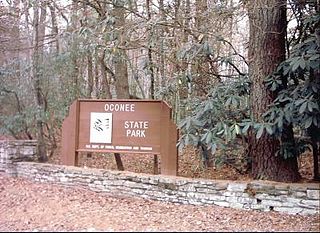
Oconee State Park is a state park located in the Blue Ridge Mountain region of South Carolina. This 1165-acre (472 ha) park has several recreational opportunities to choose from. They include cabins, camping, fishing and boating in the two small lakes located on the park grounds, hiking on eight nature/hiking trails, and several picnic and meeting facilities.
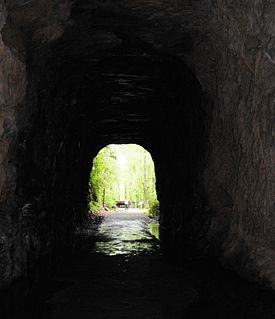
Stumphouse Mountain Tunnel in Oconee County, South Carolina is an incomplete railroad tunnel for the Blue Ridge Railroad of South Carolina in Sumter National Forest. The tunnel, along with nearby Issaqueena Falls, are now a Walhalla city park.

Oconee Station was established in 1792 as a blockhouse on the South Carolina frontier. Troops were removed in 1799. The site also encompasses the Williams Richards House, which was built in the early 19th century as a residence and trading post. The site is listed on the National Register of Historic Places in 1971 as Oconee Station and Richards House.

The Walhalla Graded School, built in 1901, is an historic building located at 101 E. North Broad Street in Walhalla, South Carolina. It was designed by noted Columbia architect William Augustus Edwards of the firm of Edwards and Walter and built by Grandy & Jordan of Greenville.
Mountain Rest is an unincorporated community near the Chattooga River in northwestern Oconee County, South Carolina. The community is on South Carolina Highway 28 adjacent to a lake on Taylor Creek.
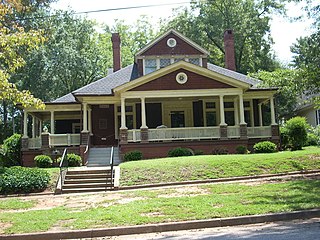
Seneca Historic District is a historic district in Seneca, South Carolina, United States, that is listed on the National Register of Historic Places.
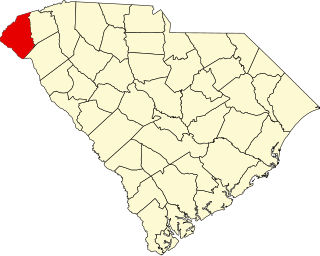
This is a list of the National Register of Historic Places listings in Oconee County, South Carolina.
The old Oconee County Jail was a former jail located on Short Street in Walhalla, South Carolina, in Oconee County. The jail was located on the grounds of the current Oconee County Courthouse. It was named to the National Register of Historic Places on November 14, 1982 along with the Oconee County Cage. At the time of its listing, the jail was one of the few remaining nineteenth or twentieth century jails in upper northwestern South Carolina. It was demolished around 1985. Subsequently, it was delisted on December 12, 1989.

The Oconee County Cage is a former jail on wheels that is located at Browns Square Drive outside of the Oconee Heritage Center in Walhalla, South Carolina, USA in Oconee County. At the time of its listing, it was located on Church Street at the Oconee County Law Enforcement Center. It was named to the National Register of Historic Places on November 14, 1982 along with the Oconee County Jail. At the time of its listing, the cage was considered the most intact cage in South Carolina. Oconee County has preserved the cage as a reminder of the former harsh conditions faced by convicts in the early twentieth century.

The Long Creek Academy is a former Christian school that is located at the intersection of Academy Road and South Carolina S-37-339 near U.S. Route 76 near Long Creek, South Carolina in Oconee County. It was named to the National Register of Historic Places on November 20, 1987. It is currently used by a whitewater rafting company.

Russell-Heath House is a historic home located near Stoneboro, Kershaw County, South Carolina. It was built about 1830, and renovated about 1906. The main block is a two-story, rectangular structure with a lateral gable roof and a one-story, gable-roof wing. It has clapboard siding and a brick pier foundation. The façade has a projecting Classical Revival portico with four granite pillars. Also on the property are two contributing early-20th century, vertical plank sheds.

Retreat Rosenwald School, also known as the Retreat Colored School, is a historic Rosenwald School located at Westminster, Oconee County, South Carolina.

Ram Cat Alley Historic District is a national historic district located at Seneca, Oconee County, South Carolina. It encompasses 18 contributing buildings in the central business district of Seneca. They were built between about 1887 and 1930. Notable buildings include the Patterson Building, Harper and Jones Building, C. F. Adams General Store, Old Seneca Post Office, and Richardson Theatre.
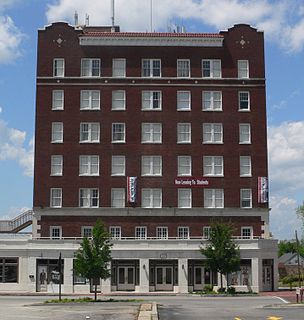
Hotel Eutaw, also known as the East Russell Street Inn, is a historic hotel located at Orangeburg, Orangeburg County, South Carolina. It was designed by architect G. Lloyd Preacher and built in 1926–1927. It is a seven-story, steel-frame with brick veneer, skyscraper with an "L"-shaped plan. The front façade features a projecting one-story, six bay, cast stone entrance block.





















